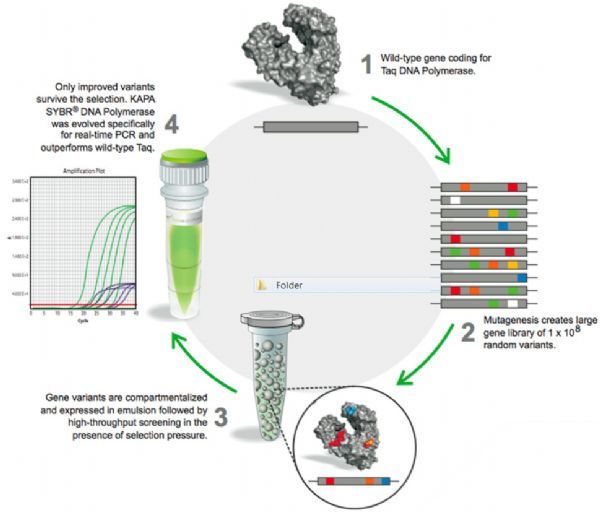Introduction of factors affecting the effect of TaqDNA polymerase
Taq DNA polymerase is the first thermostable DNA polymerase discovered, with a molecular weight of 65kD, which was originally extracted from a strain of Thermophagobacter aquaticus isolated from hot springs by Saiki et al. This article will introduce several influencing factors that affect Taq DNA polymerase.

1. The effect of temperature on TaqDNA polymerase
Although Taq DNA synthase has a strong temperature adaptation range, the environment above 60 °C will still inactivate part of the enzyme. Conversely, if the temperature is lower than normal, the enzyme activity is limited. And because the primers may combine with some homologous sequences in the genome at low temperature (especially 25-27°C), some amplified products are not the target sequence. When the temperature is appropriately increased, the mismatched bases will dissociate, and the specificity of the reaction product will increase. The optimum temperature for Taq DNA polymerase is 70℃;
2. The effect of magnesium ion concentration on TaqDNA polymerase
TaqDNA polymerase activity is very sensitive to the concentration of Mg2+. TaqDNA polymerase, like many other polymerases, is a Mg2+-dependent enzyme. Using salmon sperm DNA as a template, the total concentration of dNTPs was 0.9-0.8 mmol/L, and the reaction was carried out for 10 minutes with a PCR system containing different concentrations of MgCl2. The results showed that the enzyme activity showed a high level when MgCl2 was 2.0mmol/L. If the concentration of Mg2+ is too high, the enzyme activity will be limited. 10mmol/LMgCl2 can inhibit the enzyme activity by about 50%. Since Mg2+ can combine with negative ions or negative ion groups (such as phosphate), in PCR, DNA templates, primers and dNTPs are the main sources of phosphate, of which dNTPs account for a large proportion. Therefore, in the reaction system, the optimal concentration of Mg2+ is also affected by the concentration of dNTPs. In order to obtain the best reaction results, it is necessary to explore the reaction conditions. Whenever a new target fragment and primers are used for the first time, or when a certain parameter (dNTP or primer concentration) is changed, the optimal concentration of Mg2+ should be titrated. A general rule is that the final concentration of Mg2+ in the sample should be at least 0.5–1.0 mmol/L higher than the total dNTP concentration.
3. The effect of optimal concentration of KCl on TaqDNA polymerase
Generally, it is 50 mmol/L, and when it is higher than 75 mmol/L, the polymerization reaction is obviously limited. When the concentration of KCl was as high as 200 mmol/L, the polymerization reaction was obviously limited, and no nucleosides were incorporated in the reaction for 10 minutes. The effects of NH4ClNH4Ac and NaCl with a concentration of 50 mmol/L on TaqDNA polymerase activity were moderate inhibition, no effect and 25~30% promotion, respectively.
4. The effect of dNTP concentration on TaqDNA polymerase
A balanced low concentration of dNTPs is more conducive to the exertion of enzymatic activity, and can reduce mismatches and obtain a large amount of DNA reaction products with strong specificity. 100ul PCR systems with various nucleotide concentrations of 40umol/L can obtain 2.6ug DNA products, while only consuming half of the nucleotides provided;
5. The effect of several denaturants on enzyme activity
10% ethanol did not inhibit enzyme activity; dimethyl sulfoxide (DMSO), dimethylformamide (DMF). The formamides had no effect on the enzyme activity at low concentrations, and the enzyme activity decreased significantly with the increase of their concentration. l0% DMSO will halve the enzyme activity. However, other researchers have observed that 10% DMSO plays a beneficial role in some polymerization systems. This structurally heterogeneous phenomenon was also shown in experiments with urea. 1.0mol/L urea can improve the enzyme activity, and 2.0mol/L urea can preserve most of the enzyme activity. However, there are also reports that 0.5mol/L urea completely inhibits PCR. In conclusion, more experimental data are needed to determine the effect of denaturants on TaqDNA polymerase and PCR system parameters. TaqDNA polymerase is very sensitive to SDS, and some non-ionic detergents can completely eliminate the inhibitory effect of low concentration of SDS on enzyme activity. For example, 0.5% Twen20 and 0.5% NP40 can offset the effect of 0.01% SDS on enzyme activity.
TaqDNA Polymerase Manufacturers and Suppliers
GENETURE is a group company focused on clinical diagnostics and life sciences. We have two factories. We provide products and services with TaqDNA polymerase as the core, including nucleic acid extraction kits, nucleic acid extractors, magnetic beads, PCR kits, PCR systems, etc. Our company has passed ISO9001 and ISO13485 certification, and reagents and instruments have obtained CE and FDA certification.
Just tell us your needs, we will provide solutions, provide you with strong market backing, and serve customers with strong production capacity and strict quality control.
Email: info@geneture.com
Mobile: +86 150 1002 8687
